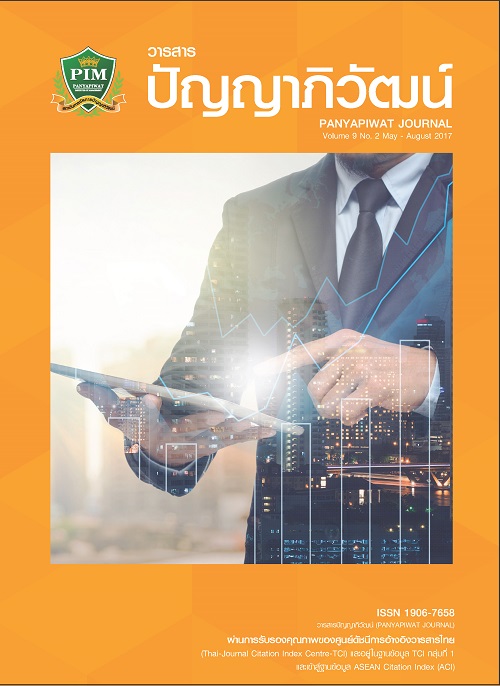ผลกระทบของทุนนิยมในมหานครเซี่ยงไฮ้ยุคหลังเหมา: กรณีศึกษาแนวคิดปัจเจกชนนิยมและความสัมพันธ์ชายหญิงในนวนิยายเรื่อง Candy ของเหมียน เหมียน
Main Article Content
บทคัดย่อ
บทความนี้มุ่งศึกษานวนิยายเรื่อง Candy ของเหมียน เหมียน ในประเด็นแนวคิดปัจเจกชนนิยมและความสัมพันธ์ชายหญิง เนื่องจากนวนิยายแสดงให้เห็นว่าแนวคิดปัจเจกชนนิยมที่ส่งผลให้เกิดความเปลี่ยนแปลงของความสัมพันธ์ชายหญิงเกี่ยวพันกับการพลิกฟื้นเซี่ยงไฮ้จากเมืองที่ล้าหลังทางเศรษฐกิจสู่การเป็นเมืองที่มีอัตราการเจริญเติบโตสูงที่สุดเมืองหนึ่งของจีน การพัฒนาทางเศรษฐกิจก่อให้เกิดการเสื่อมสลายของแนวคิดในระบอบสังคมนิยมเดิมที่เกี่ยวกับการเสียสละตนเองและความเท่าเทียมกัน การพัฒนาของระบบทุนนิยมส่งเสริมความเป็นปัจเจกชน ในขณะที่ระบบตลาดเสรีให้ความสำคัญกับความพึงพอใจส่วนตัวและการเลือกอย่างเสรี การศึกษาตามแนวคิดสายรื้อสร้างชี้ให้เห็นว่า ความรักของชายหญิงที่ปรากฏในนวนิยายสอดคล้องกับการดำเนินชีวิตของชายหญิงจำนวนหนึ่งในพื้นที่เมืองช่วงปลายทศวรรษ 1990 ความรักมีแนวโน้มที่จะเป็นความสัมพันธ์ระยะสั้นอันเกี่ยวโยงกับความพึงพอใจส่วนบุคคลและโอกาสในการเริ่มต้นความสัมพันธ์ได้เสมอ ความสัมพันธ์ดังกล่าวยังสะท้อนให้เห็นถึงการใช้อารมณ์ความรู้สึกของปัจเจกบุคคลเพื่อต่อรองกับแรงกดดันของกระแสวัตถุนิยมในเมือง
The purpose of the journal is to study Mian Main’s Candy under the topic of individualism and heterosexual relationship. The novel shows that individualism resulting changes in heterosexual relationship is concerned with the resurrection of Shanghai from the lowest to one of the highest city in economic development in China by capitalism and free market. The economic development fades away the idea of self-sacrifice and equality in old socialist society. Capitalism values individuality while free market emphasizes on an individual pleasure and free choice. The study conducted under the deconstruction approach points out that heterosexual love appeared in the novel is related to the urban living style of a group of younger generation in late 1990. Love not only tends to be a short-term relationship and depends on personal pleasure, it is also varied opportunities to begin a new relationship. The relationship reflects how urban dweller negotiates with the pressure to seek wealth and free choice which becomes part of urban life.
Article Details
“ข้าพเจ้าและผู้เขียนร่วม (ถ้ามี) ขอรับรองว่า บทความที่เสนอมานี้ยังไม่เคยได้รับการตีพิมพ์และไม่ได้อยู่ระหว่างกระบวนการพิจารณาลงตีพิมพ์ในวารสารหรือแหล่งเผยแพร่อื่นใด ข้าพเจ้าและผู้เขียนร่วมยอมรับหลักเกณฑ์การพิจารณาต้นฉบับ ทั้งยินยอมให้กองบรรณาธิการมีสิทธิ์พิจารณาและตรวจแก้ต้นฉบับได้ตามที่เห็นสมควร พร้อมนี้ขอมอบลิขสิทธิ์บทความที่ได้รับการตีพิมพ์ให้แก่สถาบันการจัดการปัญญาภิวัฒน์หากมีการฟ้องร้องเรื่องการละเมิดลิขสิทธิ์เกี่ยวกับภาพ กราฟ ข้อความส่วนใดส่วนหนึ่งและ/หรือข้อคิดเห็นที่ปรากฏในบทความข้าพเจ้าและผู้เขียนร่วมยินยอมรับผิดชอบแต่เพียงฝ่ายเดียว”
เอกสารอ้างอิง
Bech, H. (1999). City Sex: Representing Lust in Public. In Giddens, Anthony. The Transformation of Intimacy. New York: Stanford University Press.
Farrer, J. (2002). Opening up: Youth Sex Culture and Market Reform in Shanghai. Chicago and London: The University of Chicago Press.
Liu, J. (2010). The Reception of the Works of Contemporary Chinese Glam-Writers in Mainland China. Doctoral Thesis, University of York.
Mahapasuthanon, U. (2011). Chinese Womanhood in Post-Mao’s Women Novels. Ph.D. Dissertation, Literature and Comparative Literature Program, Chulalongkorn University, Bangkok. [in Thai]
Mian, M. (2000). Candy. New York: International Herald Tribune.
Scheen, L. M. (2015). Shanghai: Literary Imagining of a City in Transformation. Amsterdam: Amsterdam University Press.
Short, J. R. (2004). Global Metropolitan: Globalizing Cities in Capitalist World. London: Routledge.
Visser, R. (2010). Cities Surround the Countryside. London: Duke University Press.
Wasserstorm, J. N. (2009). Global Shanghai, 1850-2010: A History in Fragments. Abingdon, Oxon: Routledge.
Yatsko, P. (2001). New Shanghai: The Rocky Rebirth of China’s Legendary City. Singapore: Willy.


